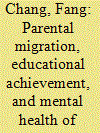|
|
|
Sort Order |
|
|
|
Items / Page
|
|
|
|
|
|
|
| Srl | Item |
| 1 |
ID:
145583


|
|
|
|
|
| Summary/Abstract |
The high level of dropout from junior high school is one of the most serious challenges facing the human capital development of the next generation of workers in China's rural areas. The goal of this paper is to assess to what extent the educational expectations of students are correlated with dropout behavior at the junior high school level in China. Using panel data, this research finds that the cumulative dropout rate is high among grade 7 and 8 students within our sample (as high as 19.5 percent, which implies a 3-year dropout rate of around 25 percent). Importantly, we find that this high rate of dropout is significantly correlated with students' educational expectations. Specifically, students who reported their expected level of education is “less than high school” or “less than college” are five times and four times more likely to drop out during junior high school than their peers, respectively.
|
|
|
|
|
|
|
|
|
|
|
|
|
|
|
|
| 2 |
ID:
145584


|
|
|
|
|
| Summary/Abstract |
This study describes the current teacher training system in China, including the prevalence of teacher training, the types of training, training content and the ways that training is delivered. The paper presents subjective evaluations of training for principals and teachers using four diverse datasets. The results show that the National Teacher Training Project (NTTP) deviates from official policy objectives in several respects. The subjects of training programs and training content are not fully compliant with policy objectives. In addition, training opportunities are offered to a smaller proportion of rural teachers than urban teachers. It is found that the proportion of teachers and principals satisfied with the NTTP is lower than that for other types of training. Therefore, measures should be taken to increase training opportunities for rural teachers and to ensure the quality of training for all teachers.
|
|
|
|
|
|
|
|
|
|
|
|
|
|
|
|
| 3 |
ID:
170104


|
|
|
|
|
| Summary/Abstract |
China's rapid development has led to an unprecedented increase in migration rates as an ever-growing number of rural residents migrate to urban areas to seek better job opportunities and help alleviate family poverty. Economic pressures and structural restrictions force many of these migrant workers to leave their children behind in their rural homes, which has led to the emergence and expansion of a new subpopulation in China: left-behind children (LBCs). This study examines the impacts of parental migration on the educational outcomes (specifically math achievement) and mental health (specifically anxiety) of LBCs using data covering 7495 children in a prefecture of Shaanxi Province (from three surveys conducted between 2012 and 2014). We distinguish between “both parents migrating,” “one parent migrating,” “only a father migrating,” and “only a mother migrating.” We also explore the impacts on male versus female LBCs. We find no significant impact of parental migration on the math achievement of LBCs. In terms of mental health, however, our results indicate that left-behind girls were negatively affected by one parent migrating, especially if the migrating parent was the father. The findings suggest that it may not be necessary for policy makers to design special programs to improve educational outcomes of LBCs in general. However, local committees, schools, and parents should pay particular attention to left-behind girls living with only one parent, as they may be more vulnerable to mental health problems than their peers.
|
|
|
|
|
|
|
|
|
|
|
|
|
|
|
|
|
|
|
|
|